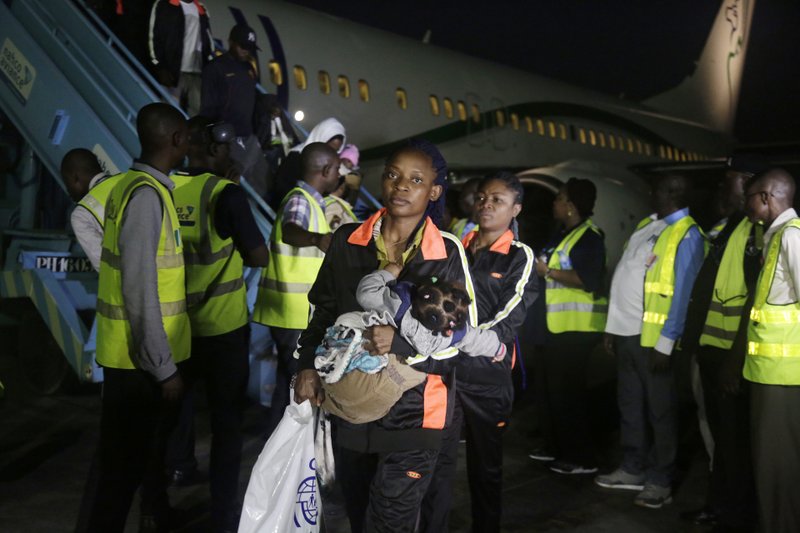WARRI, Nigeria -- As many as 700,000 migrants are stranded in dozens of camps across Libya, and a new emergency task force with the backing of the European Union, African Union and United Nations aims to send 15,000 of them home by February.
Now the returnees are posing a challenge. Back home, they face the same conditions that led them to leave: high unemployment, often weak economies, an increasingly harsh climate.
Governments across Africa are under pressure to give their citizens a reason to stay.
The EU launched a $166 million project last year with the International Organization for Migration to assist migrants repatriating to some 14 countries. It has helped in the voluntary return of over 15,000 migrants. In Nigeria, the project says it has created 300 jobs. It is not clear how many jobs have been created overall.
Local governments are launching their own efforts. Nigeria's Edo state, the source of about 80 percent of the country's migrants, is creating farming projects to help returnees. Gov. Godwin Obaseki this month approved 370 acres of land and more than $326,000 for 150 people who returned from Libya a year ago and completed agribusiness training.
Exhausted and regretful, many migrants speak of dreams lost and trust broken.
One migrant said she used to sell secondhand clothes in Edo state before she was lured at age 24 into a trip abroad. A woman told her and others that they could be nannies in France. She traveled through Niger and Libya with 150 others who hoped to make it to Europe. At least 20 died along the way from dehydration, hunger and illness.
"Many girls were raped in the course of our journey, even in the camps where the traffickers kept us" before being handed over to Libyan militiamen, she said, giving only a partial name, Itohen, for fear of retaliation. "I was lucky because I disguised as a boy before we left Nigeria."
Itohen said she would prefer government assistance so she can return to selling clothes.
An earlier returnee, Solomon Okodugha, is helping others readjust. After being deported from Libya four years ago, he became the president of the nonprofit Initiative for Youth Awareness on Migration, Immigration, Development and Reintegration and runs a cassava farm in Edo state.
"Nigerians usually have the orientation that you can only find greener pastures in Europe or America, but since my ill-fated journey years ago I have discovered that I can still make it here," he said.
Nigerians are inspired by older generations who went to Europe legally in the 1980s, he said. "Our young girls and boys are too easily lured into the trip by cartels."
Now governments, aid groups and others must "join hands" to tackle what comes next as thousands return, Okodugha said.
Nigeria, which has the highest number of illegal and legal migrants in Libya, has taken the lead in taking people home even as the attraction of Europe remains.
"Until the government takes drastic action in the arrest and prosecution of the cabals involved in the trafficking, the threat will not stop," said Edward Oforomeh, who works in Edo state and leads a campaign against human trafficking.
More than 6,600 Nigerians have been repatriated so far this year.
Patrick Osayomore was one of them. He left Nigeria last year after the collapse of his phone-repair business. He said he was detained in Libya by militiamen in January and held until November, when he was rescued.
Now he wants to remain at home and invest in rice farming. It's an expensive endeavor, he said, and if the government comes to his aid, he will be grateful.
Information for this article was contributed by Carley Petesch of The Associated Press.
A Section on 12/30/2017

